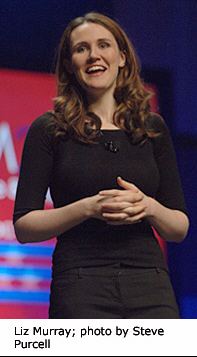Success is answering your “what if” questions, according to Liz Murray, closing keynote speaker June 28 at the Society for Human Resource Management's Annual Conference in Washington, D.C.
“Pick your most important questions and spend your life answering them,” she urged. “What is the difference between the people who are successful and the people who are resigned to failure?” she asked. “Maybe turning one day into the next passively is all you have to do to mess up your life.”
In Murray’s case, those early questions were as basic as “What if I got a job? What if I went to school?”

Murray told attendees her riveting story of enduring a childhood of neglect and poverty with drug-addicted parents to finish high school and win a scholarship to Harvard University. Her story was made into the 2003 Lifetime network movie “Homeless to Harvard.”
Murray and her older sister lived with their parents in an impoverished neighborhood of the Bronx in New York. Their only income was a monthly welfare check, most of which her parents spent on drugs. As the trash-strewn apartment—and her parents’ health—deteriorated, the girls were left to fend for themselves, sponging food off neighbors and rarely attending school. “I became very self-sufficient. If I needed something, it was me and the world,” although “that’s very isolating … you need someone to pay attention to you.”
Yet she never felt bitter toward her parents, Murray said. “There was much love between us.” She realized that “they simply are not functioning—people can’t give you what they don’t have.”
A “revolving door of social workers” simply lectured her about her truancy and threatened to break up the family and send her to a group home, a scenario that came to pass when her mother acquired HIV from infected needles and her father lost the apartment and became homeless.
Murray fell into a clique of “Goth” friends who were chronic complainers and who, she says, were simply “waiting to open our welfare cases when we turned 18.” She slept in subways, on rooftops and occasionally in the homes of friends, living a life of shoplifting and begging for change.
While she “had this nagging sense that there were things I was supposed to be doing better in life,” Murray procrastinated, rationalizing that there was too much upheaval in her life and she would “get a job later … go to school later.” Then 16, she visited her hospitalized mother less and less, and had not seen her for a month when she died in 1996.
The impact of her mother’s death “was like someone turned the volume on that voice in my head all the way up.” Despite being broke and homeless, she gained admittance at age 17 to a 150-student alternative high school in New York and took a double courseload to graduate in two years.
She credited an encouraging school official, Perry, with believing in her, looking beyond her dirty clothes to see her intelligence and personal qualities, and inspiring her to do the extra work necessary to get her life on track. When she won a competitive scholarship from The New York Times, she was able to fulfill a dream of attending Harvard University, entering in 2000.
Perry helped Murray “believe in myself in a way that was not possible before. He turned it around. It became about confidence, not fear.”
A newspaper article about the student scholarship winners launched publicity that garnered speaking invitations, first to disadvantaged youths in schools and, later, to business groups and professional conferences. She later transferred to Columbia University in New York, and said she now plans to study organizational behavior in graduate school.
Murray urged the HR professionals to consider: “When you go back to your environment and you deal with employees … do you inspire people or do you make them feel fear? Do you make them feel confident or incompetent? I think that distinction really marks the leader.”
Leon Rubis is editorial director of SHRM.
An online wrapup of events at SHRM’s Annual Conference can be found at www.shrm.org/hrnews/06annual.
Advertisement
An organization run by AI is not a futuristic concept. Such technology is already a part of many workplaces and will continue to shape the labor market and HR. Here's how employers and employees can successfully manage generative AI and other AI-powered systems.
Advertisement


